CNN's Planet In Peril
Monday night, I had the chance to watch a summarized screening of the anticipated series "CNN's Planet In Peril" (which I've seen being promoted on CNN for the past month) at Greenbelt-3 in Makati. Though a bit sensationalist, overworked (Jeff Corwin is OA-Over Acting as usual) and slightly drawn out, the documentary provides a stunning illustration and first-hand account of environmental strife in 13 countries across four continents.
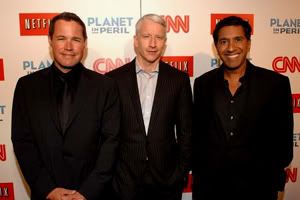
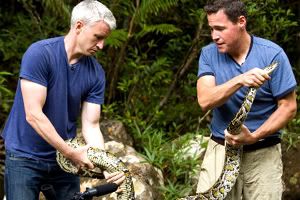
The event is a preview to the 2-hour 2-episode series that will air on CNN October 24 and 25 at 9PM (Manila). For international airing schedules, please visit: CNN's Planet In Peril.
CNN's Planet In Peril
Nearly a year in the making, PLANET IN PERIL takes viewers to four continents and 13 countries where environmental change is not a theory, or possibility, but a crisis happening in real time. Filmed in high-definition, this four-hour documentary tackles the threats to the world's environment and airs on CNN International on October 24th and 25th.
Bringing viewers the stories behind the statistics, CNN anchor Anderson Cooper, chief medical correspondent Dr. Sanjay Gupta and Animal Planet host and wildlife biologist Jeff Corwin will focus on four main issues that threaten the planet and its inhabitants: climate change, deforestation, species loss and overpopulation.
Broadcast to a combined audience of more than 300 hundred million households on CNN International and CNN/US with an in-depth companion site on www.cnn.com/planetinperil, the documentary brings first-hand accounts of environmental strife as Cooper, Corwin and Gupta travel across the globe to explore these changes and reveal what they mean for each region and the world at large.
Cooper and Corwin travelled to Brazil to examine connections between the rapid deforestation of the Amazon River Basin and changes in the world's climate, embedding with "poacher police" amid raids of illegal logging camps. In Thailand and Cambodia, they walk the markets where endangered animals are bought and sold to find out how their removal can affect entire ecosystems. Additionally, they travelled to Greenland to report on its melting ice sheet, where Cooper witnessed one of the world's newest islands, discovered when the ice receded.
Taking viewers beyond the broad headlines, Corwin visits Alaska to help viewers understand how North America's largest carnivore, the polar bear, is quickly losing its habitat and exists at the edge of extinction. Cooper and Corwin report from Yellowstone Park to show how park officials reintroduce species to their native environment.
With his extensive medical expertise, Gupta brings a deep understanding of the environmental pressures on the human population. In China, Gupta examines how the world's most populous nation consumes its natural resources and the toll it takes on its people and the entire world. He also reports from Central Africa to show how climate change is drying up one of the world's largest lakes and the impact that is having on a region already in crisis.
The discussion conducted after the 1-1/2hr. preview was moderated by Ms Che Che Lazaro. The floor's discussion was pretty insightful, but may be shallow at some point if you're working on the environmental awareness and sustainable development field for a long time.
I can't judge the CNN Documentary at this point since what we were able to watch is just a preview, but thus far, it does have a little bias and the perspective is a little bit 'American.'
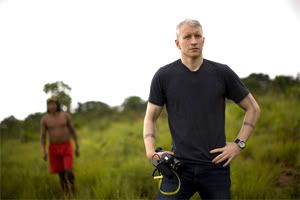
One of the focus areas of Anderson Cooper's investigation was the Yellowstone Park's success on bringing back its old wolves, the story highlights the importance of each and every specie on an ecosystem and how one extinction of which can affect the whole chain and eventually damage the whole environment. It's quite a moving story of how bringing back Yellowstone Park's old wolves rekindle the natural instincts of its preys, how their adrenaline triggers diarrhea when nervous, how those droppings served as a superb fertilizers and expedite the growth of ferns and other plants, and how those plants became a new home for the birds.
Anderson also undergo a body-chemical level testing. It's quite alarming to know that his 1970's inhalation of some chemicals can still be found, and very well defined, within his bloodstream. And how his everyday work for CNN causes him to have an extremely high-level of some particular chemicals that came from his use of cosmetics. The chemical-level testing is quite alarming for me and will be for other people especially the ones who live in the city.
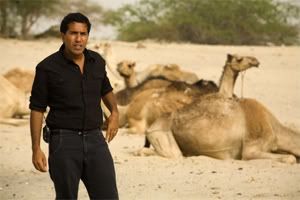
In China, Dr. Gupta examined how the world's fastest growing country uses natural resources and the toll it takes on its people and the entire world. CNN sent Gupta to investigate cancer rates in the Guandong province, an area notorious for corporate-sponsored industrialism that causes rivers and streams to turn yellow and red. Dr. Gupta's take on the medicinal tradition of Chinese, as well as their addiction to exotic foods and inhumane animal market is a very painful scenario, so depressing that it will lead you to hopelessness. At one point, their is this one bear who continues to live for months or years, with an extraction device on it's stomach, design to collect medicinal essences from his body, the bear is lying down almost dead and was like that for weeks.
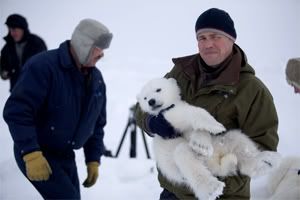
It is almost hopeless since these traditions are ancient and has been around for thousands of years and it's extremely difficult to even draft an idea how such practices can be changed.
Animal Planet host and wildlife biologist Jeff Corwin, lead the tour, as undercover investigators probing environmental catastrophe from Madagascar to Greenland, Yellowstone to China, Brazil to the Carteret Islands off Australia. Corwin and Cooper went to Bangkok too, to investigate the JJ Market, the Cartimar-counterpart in Manila.
The documentary shows a tad lot of extremely pressurizing scenarios of our earth's current condition, and can possibly make you think of a step you can do right now. Cinematography and production is exceptional, since it's an American documentary. My comment on bias would best be articulated by citing these examples, the Thai investigations were more than overworked, investigations held in China and Thailand were both extremely negative highlighting even more the consumption China is making, while their report about Yellow Stone Park, since it's in the US is nothing but positive. It would be more insightful if they could have featured the way Americans in US are consuming plastic and non-biodegradable materials because of their busy lifestyle among others.
My Rating:
This post is a review post from my Angel's Hub Reviews via Multiply.


















1 Comments:
yeezy supply
nike air max
nike epic react
supreme outlet
off white clothing
golden goose sneakers
supreme new york
kyrie 6
kd 12
yeezy shoes
Post a Comment